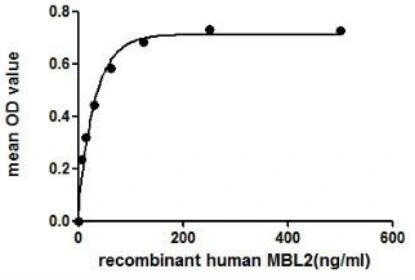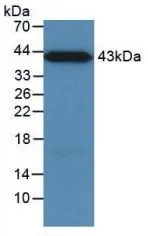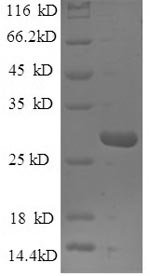
Functional ELISA analysis of GTX00127-pro Human MBL2 protein which can bind immobilized MASP2 protein.
Human MBL2 protein, His and GST tag
GTX00127-PRO
ApplicationsFunctional Assay
Product group Proteins / Signaling Molecules
Protein IDP11226
Overview
- SupplierGeneTex
- Product NameHuman MBL2 protein, His and GST tag
- Delivery Days Customer9
- Application Supplier NoteMBL2 (Mannose-binding protein C) is a calcium-dependent lectin involved in innate immune defense, which binds mannose, fucose and N-acetylglucosamine on different microorganisms, therefore results in activation of the lectin pathway of the complement system. It has been proven that MASP-2 (Mannan-binding lectin serine protease 2) forms complexes with the pattern recognition molecules MBL2, triggers the activation of the complement system. Thus, a functional binding ELISA assay was constructed to detect the association of rhMBL2 with MASP2. Briefly, rhMBL2 were diluted serially in 10mM Tris-HCl, 1M NaCl, 5mM CaCl2, and 0.05% Triton X-100 (pH 7.4). Duplicate samples of 100 microl were then transferred to MASP2-coated microtiter wells and incubated for 2h at 37oC. Wells were washed with PBST and incubated for 1h with anti-MBL2 mAb, then aspirated and washed 3 times. After incubation with HRP labeled secondary antibody, wells were aspirated and washed 3 times. With the addition of substrate solution , wells were incubated for 15-25 minutes at 37oC. Finally, add 50 microl stop solution to the wells and read at 450nm immediately. The binding activity of MBL2 with MASP2 was in a dose dependent manner.
- ApplicationsFunctional Assay
- CertificationResearch Use Only
- ConjugateUnconjugated
- Gene ID4153
- Target nameMBL2
- Target descriptionmannose binding lectin 2
- Target synonymsCOLEC1, HSMBPC, MBL, MBL2D, MBP, MBP-C, MBP1, MBPD, mannose-binding protein C, collectin-1, mannan-binding lectin, mannose-binding lectin (protein C) 2, soluble (opsonic defect), mannose-binding lectin 2, soluble (opsonic defect)
- Protein IDP11226
- Protein NameMannose-binding protein C
- Scientific DescriptionThis gene encodes the soluble mannose-binding lectin or mannose-binding protein found in serum. The protein encoded belongs to the collectin family and is an important element in the innate immune system. The protein recognizes mannose and N-acetylglucosamine on many microorganisms, and is capable of activating the classical complement pathway. Deficiencies of this gene have been associated with susceptibility to autoimmune and infectious diseases. [provided by RefSeq, Jul 2008]
- Storage Instruction-20°C or -80°C,2°C to 8°C
- UNSPSC41116100
- SpeciesHuman



